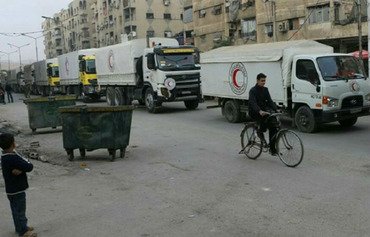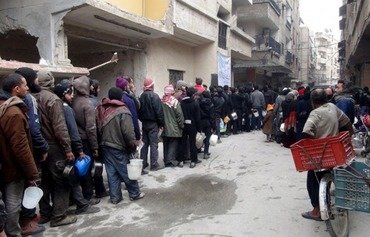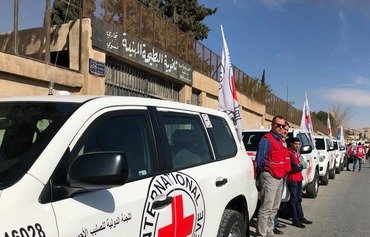Residents of Douma in the Eastern Ghouta region outside Damascus have been staging demonstrations to protest the skyrocketing prices of food.
The latest spike in the price of food is connected with additional fees the Syrian regime has imposed on merchants to allow them to bring goods into the opposition-held area, which is under siege by regime and allied forces.
Eastern Ghouta has been experiencing its worst conditions to date, due to the shortage and high price of food, activist Mohammed al-Beik of the Eastern Ghouta local co-ordination committee told Diyaruna.
After residents staged repeated demonstrations, he said, the regime allowed food to enter via one crossing -- the al-Wafideen crossing on the east side of Douma.
But this concession came at a heavy price, he said, as the regime imposed a fee of 2,000 Syrian pounds ($3.87) per kilogramme of food brought into the opposition-held area, and restricted imports to 5,000 tonnes per month.
"As a result of this action, each kilogramme of food will be sold at 2,000 pounds above its base price, at a time when food prices in Eastern Ghouta are already three or four times higher than they are in other areas," he said.
Protests erupt in Douma
Douma, which is the administrative centre of the district of the same name, hosts a large number of internally displaced persons (IDPs) from other areas.
In recent days, and on Wednesday and Thursday (October 18th and 19th) in particular, local residents and the displaced population have assembled in the city to protest the fees and demand a stop to them, al-Beik said.
Th regime has blocked humanitarian aid from entering the region, he said, and many residents are not able to purchase food at the current high prices.
"Residents of Eastern Ghouta are living under very poor financial conditions to begin with, as most entrepreneurial activity has come to a standstill, and state employees are not receiving their salaries," he said.
This puts most basic items beyond the purchasing power of many people, he added.
The Trade and Economy Department that manages the Eastern Ghouta crossings is considering a boycott of incoming goods from regime-held areas, al-Beik said.
This would exert pressure on the regime to reverse its decision, he explained.
These goods are already taxed before the additional fee is imposed, he stressed, and transport and warehousing costs are added to their base prices.

![Residents of the Syrian city of Douma demonstrate to demand a stop to the additional fees imposed by the regime on food that enters their area. [Photo courtesy of Syrian Revolution Forces media office]](/cnmi_di/images/2017/10/20/10087-Douma-residents-protest-600_384.jpg)






